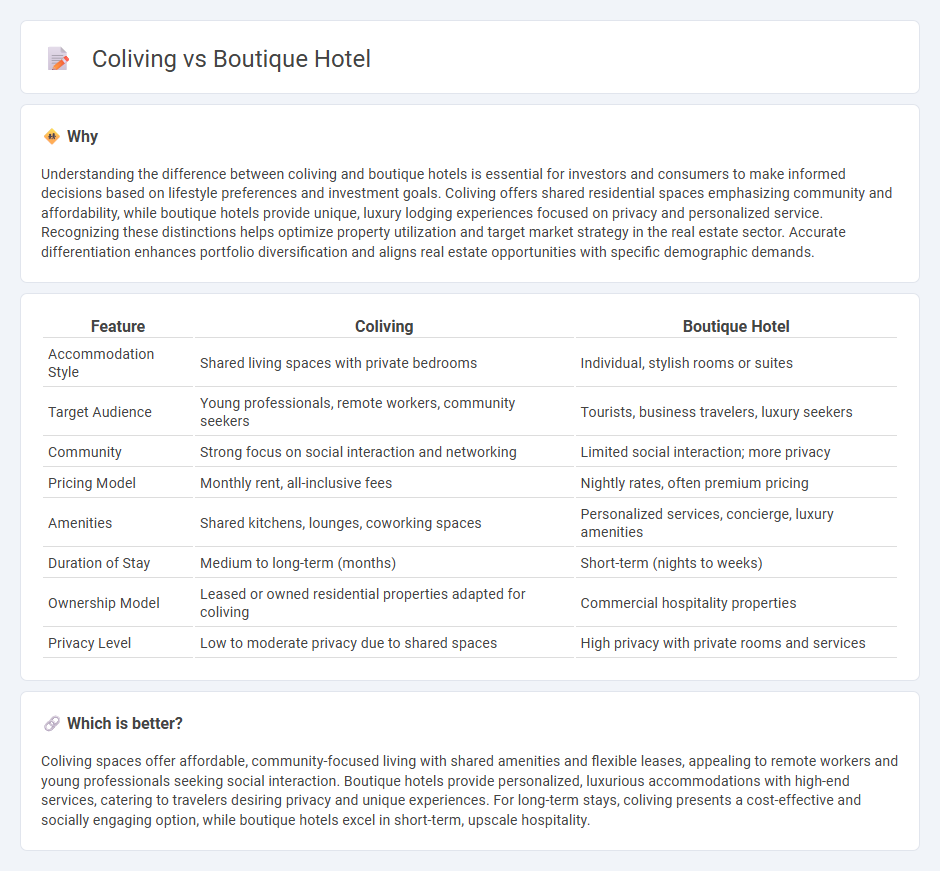
Coliving spaces offer affordable, community-driven living with shared amenities tailored for long-term residents, while boutique hotels provide personalized, luxury accommodations primarily for short stays. Coliving emphasizes social interaction and flexible leases, attracting remote workers and millennials, whereas boutique hotels prioritize unique design, privacy, and high-end services. Explore the nuanced benefits of coliving and boutique hotels to determine which option suits your lifestyle or investment goals best.
Why it is important
Understanding the difference between coliving and boutique hotels is essential for investors and consumers to make informed decisions based on lifestyle preferences and investment goals. Coliving offers shared residential spaces emphasizing community and affordability, while boutique hotels provide unique, luxury lodging experiences focused on privacy and personalized service. Recognizing these distinctions helps optimize property utilization and target market strategy in the real estate sector. Accurate differentiation enhances portfolio diversification and aligns real estate opportunities with specific demographic demands.
Comparison Table
| Feature | Coliving | Boutique Hotel |
|---|---|---|
| Accommodation Style | Shared living spaces with private bedrooms | Individual, stylish rooms or suites |
| Target Audience | Young professionals, remote workers, community seekers | Tourists, business travelers, luxury seekers |
| Community | Strong focus on social interaction and networking | Limited social interaction; more privacy |
| Pricing Model | Monthly rent, all-inclusive fees | Nightly rates, often premium pricing |
| Amenities | Shared kitchens, lounges, coworking spaces | Personalized services, concierge, luxury amenities |
| Duration of Stay | Medium to long-term (months) | Short-term (nights to weeks) |
| Ownership Model | Leased or owned residential properties adapted for coliving | Commercial hospitality properties |
| Privacy Level | Low to moderate privacy due to shared spaces | High privacy with private rooms and services |
Which is better?
Coliving spaces offer affordable, community-focused living with shared amenities and flexible leases, appealing to remote workers and young professionals seeking social interaction. Boutique hotels provide personalized, luxurious accommodations with high-end services, catering to travelers desiring privacy and unique experiences. For long-term stays, coliving presents a cost-effective and socially engaging option, while boutique hotels excel in short-term, upscale hospitality.
Connection
Coliving and boutique hotels share a focus on creating personalized, community-driven living experiences that cater to modern urban lifestyles. Both offer flexible, fully furnished spaces with emphasis on design, comfort, and social interaction, attracting young professionals and digital nomads. This convergence drives innovation in real estate, blending residential convenience with hospitality services for enhanced tenant engagement.
Key Terms
Ownership Structure
Boutique hotels are typically owned by individual entrepreneurs or small companies, providing a personalized hospitality experience with full control over property management and guest services. Coliving spaces operate under shared ownership or management models, often involving partnerships between real estate investors and community-focused operators, emphasizing communal living and flexible lease arrangements. Explore the distinct ownership frameworks to understand their impact on lifestyle and investment opportunities.
Revenue Model
Boutique hotels generate revenue primarily through nightly room rates, premium services, and exclusive guest experiences, leveraging brand uniqueness and location appeal to attract high-paying clientele. In contrast, coliving spaces focus on longer-term rental agreements, community-driven amenities, and flexible lease terms to ensure steady cash flow and occupant retention. Explore our in-depth analysis to understand which revenue model best suits your investment strategy.
Target Demographic
Boutique hotels primarily cater to affluent travelers seeking unique, personalized experiences with stylish design and high-end amenities, often appealing to couples or solo tourists. Coliving spaces attract young professionals and digital nomads who prioritize community, affordability, and flexible living arrangements in urban environments. Explore detailed comparisons to understand which accommodation best fits your lifestyle and travel needs.
Source and External Links
What is a Boutique Hotel? A Clear Definition with Examples - This article provides a detailed explanation of what a boutique hotel is, including its history, style, and examples of notable boutique hotels.
Boutique hotel - Wikipedia - This Wikipedia page offers an overview of boutique hotels, covering their history, characteristics, and the concept behind them.
Everything You Need to Know About Boutique Hotels - This blog post discusses the unique features and benefits of boutique hotels, including their intimate atmosphere and personalized service.
 dowidth.com
dowidth.com